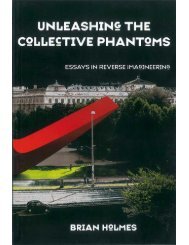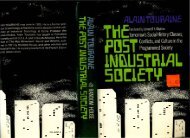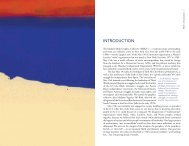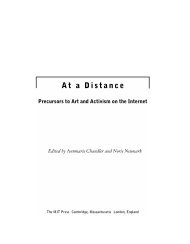Plagiarism: Art As Commodity and Strategies for ... - El plagio literario
Plagiarism: Art As Commodity and Strategies for ... - El plagio literario
Plagiarism: Art As Commodity and Strategies for ... - El plagio literario
Create successful ePaper yourself
Turn your PDF publications into a flip-book with our unique Google optimized e-Paper software.
ion, time, which began with the first copy, is rapidly running out.<br />
Waldemar Jyroczech (1987, previously unpublished: from a <strong>for</strong>thcoming book)<br />
PLAGIARISM COMMON WITH THE INTELLECTUALS WHO FOUNDED THE UNITED STATES<br />
EVEN as Senator Joseph Biden's Judiciary Committee was grilling the <strong>for</strong>emost exponent of the<br />
doctrine of Original Intent, the Senator stood accused of the very thing that the Founders intended<br />
<strong>and</strong> practiced so well — plagiarism. The Founders were quite adept at borrowing, almost always<br />
without acknowledgement, from other writers, living <strong>and</strong> dead.<br />
Consider the case of Thomas Jefferson. Some of the most moving <strong>and</strong> memorable lines from The<br />
Declaration of Independence were lifted straight from other writers, most notably John Locke, the<br />
17th century English political philosopher. Jefferson's fellow Virginian, Richard Henry Lee, was not<br />
as impressed as everyone else by the rhetorical power of the Declaration. 'Tom,' he said, 'just copied<br />
it from Mr. Locke.' Well, parts of it anyway. Here is Jefferson's Declaration:<br />
"...all experience hath shewn that mankind are more disposed to suffer while evils are<br />
sufferable than to right themselves by abolishing the <strong>for</strong>ms to which they are accustomed."<br />
And Locke's Second Treatise (1690):<br />
"People are not so easily got out of their old <strong>for</strong>ms of government... the People... are<br />
more disposed to suffer, than right themselves by Resistance."<br />
The Declaration abounds with such borrowings.<br />
So, <strong>for</strong> that matter, do The Federalist Papers. <strong>As</strong> Douglass Adair demonstrated several years ago,<br />
James Madison borrowed copiously from the writings of the 18th century Scottish philosopher<br />
David Hume, without acknowledging or crediting his source. Similarly, Madison's fellow Federalist<br />
James Wilson borrowed freely from Rousseau's Social Contract. <strong>As</strong> Garry Wills notes in a <strong>for</strong>thcoming<br />
essay on Wilson's political philosophy, 'Wilson has studied the book well <strong>and</strong> uses large excerpts<br />
from it without citation in the ratifying debates of 1787 as well as in his law lectures of 1790'.<br />
The list of distinguished plagiarists could be extended to include Alex<strong>and</strong>er Hamilton, John Adams,<br />
<strong>and</strong> even George Washington himself. The fact is, or was, that in the 18th century the practice that<br />
we call plagiarism was both common <strong>and</strong> morally acceptable. The borrowing of another's ideas <strong>and</strong><br />
phrases brought no discredit upon the borrower.<br />
But if the Founders could get away with plagiarism, why couldn't Senator Biden? The answer to<br />
that question reveals a good bit about our present attitudes toward political ideas <strong>and</strong> language, <strong>and</strong><br />
even more about the ways in which they differ from those of the Founders.<br />
Educated men <strong>and</strong> women in the 18 th century considered themselves members of an international<br />
<strong>and</strong> intergenerational community of discourse. Political ideas <strong>and</strong> idioms were common property,<br />
owned <strong>and</strong> shared by all members of that community. Their readers recognized immediately that<br />
Jefferson had borrowed freely from Locke <strong>and</strong> Madison from Hume. Far from diminishing Jefferson's<br />
<strong>and</strong> Madison's stature, the borrowing actually only served to enhance the reputation of Locke<br />
<strong>and</strong> Hume. In this respect, political writing <strong>and</strong> rhetoric was what economists nowadays call a positive-sum<br />
game in which all players are made better off.<br />
Senator Biden found himself in a very different linguistic game, a zero-sum game, in which one<br />
player's loss is another's gain. We no longer belong to a common community of discourse. Political<br />
ideas <strong>and</strong> phrases are 'private property' upon which 'trespassing' is strictly <strong>for</strong>bidden. There are no<br />
borrowers, only thieves. Imitation is tantamount to theft <strong>and</strong> an 'admission' of rhetorical incompetence<br />
<strong>and</strong> lack of creativity.<br />
Is this progress? I doubt it. The privatization of political discourse impoverishes our language.<br />
And as we speak, so we are. Is it any wonder that the quality of public speech in our time is at such<br />
a low ebb <strong>and</strong> that the accompanying quality of thought is likewise so greatly diminished? I, <strong>for</strong><br />
one, am afraid to put men to live <strong>and</strong> trade each on his own private stock of reason, because I<br />
suspect that this stock in each man is small, <strong>and</strong> that we would do better to avail ourselves of the<br />
general bank <strong>and</strong> capital of nations, <strong>and</strong> of ages. I said that; but I borrowed it from Edmund Burke.<br />
Mario Rossi (original plagiarism 1987, previously unpublished under this name).






